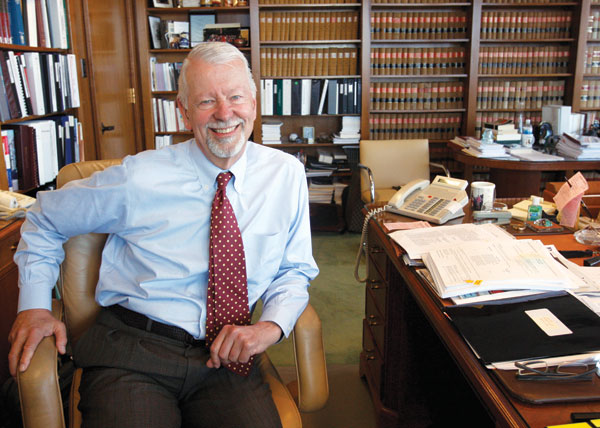Lawyers file brief claiming Vaughn Walker’s ruling striking down gay marriage ban should be invalidated because he is gay and in a relationship with a man

JUDGING THE JUDGE | In this July 8, 2009 file photo, Judge Vaughn Walker is seen in his chambers at the Phillip Burton Federal Building in San Francisco, Calif. Lawyers for the sponsors of California’s voter-approved same-sex marriage ban have filed briefs with the appeals court asking that Walker’s ruling striking down Prop 8 be invalidated because he is gay. (San Francisco Chronicle, Paul Chinn/Associated Press)
LISA LEFF | Associated Press
editor@dallasvoice.com
SAN FRANCISCO — The sponsors of California’s voter-approved same-sex marriage ban have asked a federal court to invalidate the ruling of the federal judge who struck it down, saying the judge should be disqualified because he did not divulge he was in a long-term relationship with another man.
Lawyers for the Proposition 8’s backers filed their open brief on the issue late Monday, Oct. 3, with the 9th U.S. Circuit Court of Appeals in San Francisco. They claim that another federal judge erred when he concluded U.S. Chief Judge Vaughn Walker’s relationship status was irrelevant to Walker’s ability to fairly preside over the trial on the measure’s constitutionality.
In their brief, they argue that Walker’s impartiality can be questioned because he is “similarly situated” to the plaintiffs who sued to overturn Proposition 8, two same-sex couples in established relationships. They also said that while Walker has not indicated if he and his partner wish to marry, research presented as evidence in the trial found that two-thirds of unmarried same-sex couples would tie the knot if they could.
“Given that Judge Walker was in a long-term, same-sex relationship throughout this case (and
for many years before the case commenced), he was, in Plaintiffs’ own words, ‘similarly situated to (Plaintiffs) for purposes of marriage,’” the lawyers wrote. “And it is entirely possible — indeed, it is quite likely, according to Plaintiffs themselves — that Judge Walker had an interest in marrying his partner and therefore stood in precisely the same shoes as the Plaintiffs before him.”
Walker’s successor, Chief Judge James Ware, rejected similar arguments in late August, after the coalition of religious conservative groups that qualified Proposition 8 for the November 2008 ballot made the first attempt in the nation to disqualify a sitting judge based on sexual orientation.
Ware said the presumption that Walker could not be unbiased was “as warrantless as the presumption that a female judge is incapable of being impartial in a case in which women seek legal relief.”
In an apparent response, the coalition’s attorneys wrote that they were not suggesting that gay or lesbian judges could never preside over cases involving gay rights questions.
“We know of no reason to believe, for example, that Judge Walker would have any personal interest in the outcome of litigation over, say, the constitutionality of the military’s ‘don’t ask, don’t tell’ policy,” they said. “Nor would there be any issue with a gay or lesbian judge hearing this case so long as a reasonable person, knowing all of the relevant facts and circumstances, would not have reason to believe that the judge has a current personal interest in marrying.”
The 9th Circuit already is reviewing whether Walker properly concluded the ban violates the rights of gay Californians and if Proposition 8’s sponsors were eligible to appeal his ruling once the state’s attorney general and governor declined to challenge it. A decision could come down at any time.
This article appeared in the Dallas Voice print edition October 7, 2011.














Judge Walker could have gotten married when the other 18,000 gay couples in California had married. So this entire argument is invalid. They lost the case because they didn’t present ANY evidence that same-sex marriage would harm opposite-sex marriages or society.
I agree with David. Most couples who had been in long-term relationship when marriage became available in California (as Walker was) had ample time to decide if getting married was something they wanted to do before Prop 8 became law. Walker and his partner chose not to marry.
The arguments against same sex marriage contained in the Prop 8 trial and advanced by the proponents
of Prop 8 are a laughing stock. The defenders have no case and they know it. It is a great shame
.
@ Frank: This is exactly why these same people want the video record of the trial to stay sealed. They look and sound like fools.
So it would be okay for someone who is a heterosexual to decide, because they wouldn’t be bias either? Either they would be for same-sex marriage or against it, so this claim is beyond ridiculous.
The complaint is basically like saying black judges should preside over cases of racial discrimination. It just illustrates how clueless the prop 8 backers are.